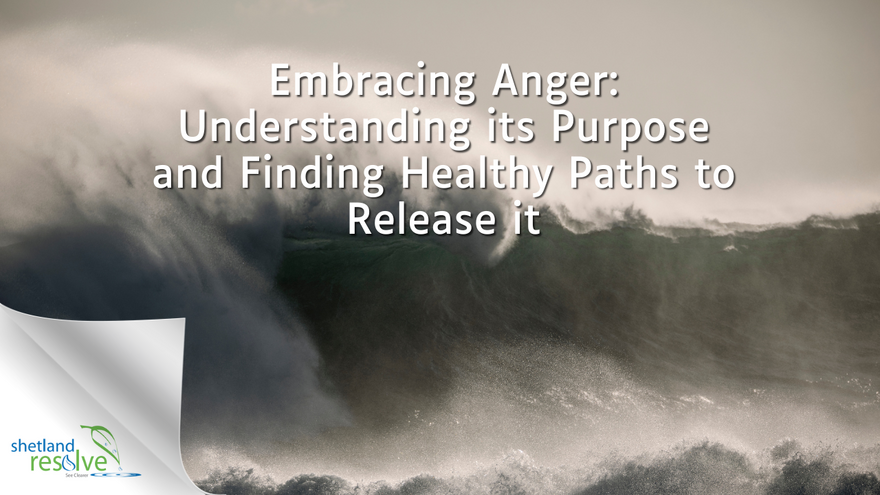
Anger is a complex and deeply human emotion that often carries a heavy stigma. Many people view it solely as a negative force to be suppressed or avoided.
However, it’s important to recognise that anger serves a significant purpose in our emotional landscape.
By understanding this emotion, we can nurture it and learn to process it in a way that supports personal growth and promotes healthier relationships with ourselves and others.
The Healthy Purpose of Anger
At its essence, anger acts as a signal that something in our environment isn’t right. It may arise when we:
experience injustice
feel our boundaries have been violated, or
confront situations that challenge our values.
In this light, anger is not merely something to be feared or eliminated; it can be a guiding force that encourages us to explore what truly matters to us.
When channelled healthily, anger can be a source of:
Self-Assertion: Anger helps establish and reinforce our personal boundaries, encouraging us to stand up for ourselves and our needs.
Inspiration for Change: This emotion can motivate us to confront issues in our lives or society, driving us towards meaningful change.
Self-Discovery: Recognising our anger allows for deeper reflection and understanding of our beliefs and values.
The Impact of Unprocessed/suppressed Anger
Unprocessed anger from past experiences can lead to disproportionate reactions or outbursts in present situations. When we have unresolved feelings from prior events, they can resurface unexpectedly, prompting us to react more intensely than the present situation warrants. This cycle can result in confusion, guilt, and frustration, both for ourselves and those around us.
Recognising that past anger is influencing present reactions is a crucial step in healing and, for intense issues, processing old anger with the guidance of a therapist or hypnotherapist can offer profound insights and healing. They can help you work through unprocessed emotions, untangling the past from the present and equipping you with tools to cope with reactions in healthier ways.
Recognising Anger: A Gentle Approach
For many, recognising and accepting anger can be challenging, especially if expressing this emotion wasn’t safe in earlier life experiences. Some may have learned to dismiss or ignore their feelings, not realising they are experiencing anger.
Acknowledging anger requires a gentle, compassionate approach:
1. Tune In to Your Emotions: Start by checking in with yourself regularly. Pay attention to physical sensations, thoughts, or changes in energy levels. You may feel tension in your body or have recurring thoughts about a specific situation. These can be clues pointing towards anger
2. Create a Safe Space: Allow yourself to feel without judgment. Understanding that it’s okay to feel angry can open the door to healing. Remind yourself that all emotions, including anger, are valid and serve a purpose.
3. Practice Self-Compassion: If anger feels overwhelming or unfamiliar, be gentle with yourself. Understand that it’s okay not to have all the answers right away. Acknowledge your feelings with kindness; this is a part of your human experience.
Healthy Ways to Process and Release Anger
Processing anger in a constructive way is essential for emotional health. Here are some gentle approaches to help you navigate this powerful emotion:
1. Engage in Mindfulness: Exploring mindfulness techniques, such as deep breathing or meditation, can help create a sense of calm and provide clarity amid intense emotions. Grounding yourself in the present allows you to respond thoughtfully rather than react impulsively.
2. Express Yourself Creatively: Find outlets that resonate with you - whether it’s journaling, painting, or engaging in physical activities. Channelling your anger into creative expression can transform intense feelings into something therapeutic and meaningful.
3. Communicate from the Heart: When you feel ready, gently express your feelings to those involved. Use “I” statements to describe your experiences without placing blame. For example, “I feel overwhelmed when…” This approach promotes understanding and connection rather than defensiveness.
4. Explore Supportive Tools: Consider seeking support from a professional who can help you work through your emotions. Hypnotherapy can facilitate a deeper understanding of anger and help you reframe your relationship with it. Using hypnotherapy audio such as Calm Seas, Strong Shores: Transforming Anger into Strength can be a wonderful resource, allowing you to explore and process your feelings safely and constructively.
Embracing anger as a natural part of the emotional spectrum can empower you to navigate life’s challenges with greater authenticity and resilience.
By recognising its purpose and learning to process it healthily, you can foster better communication and create deeper connections with yourself and others.
As you embark on this journey of self-discovery, consider incorporating some of these ideas.
They’ll guide you in nurturing a healthy relationship with anger, leading to a more balanced, fulfilling, and harmonious life.

Comments